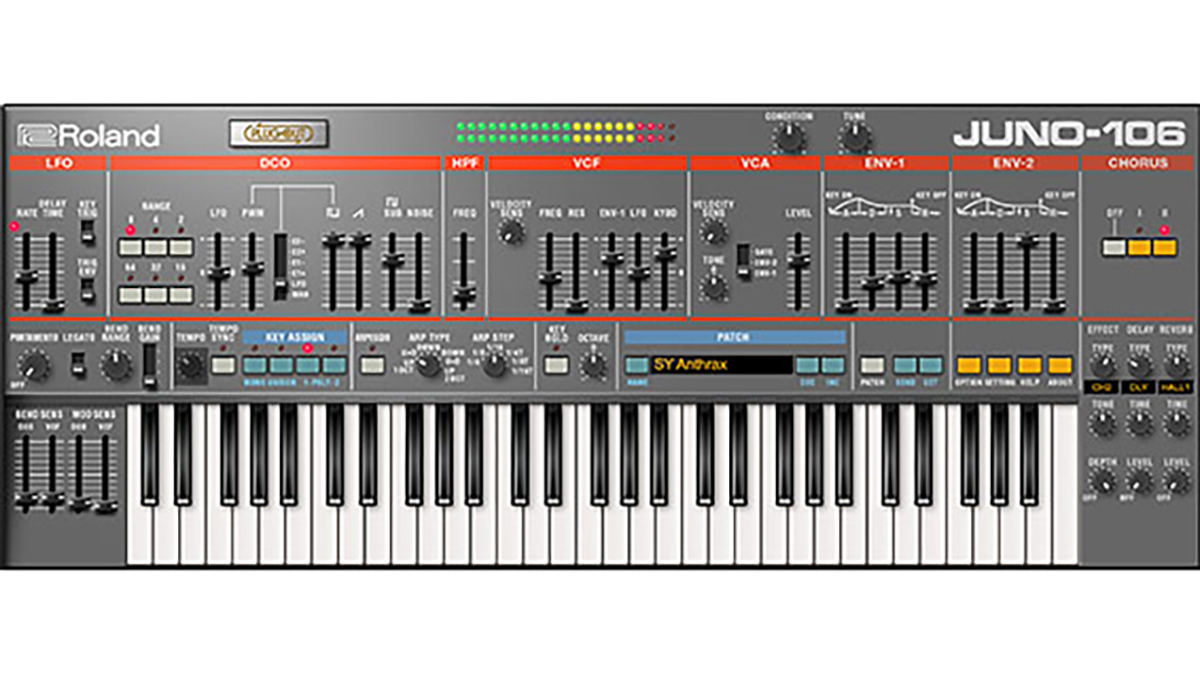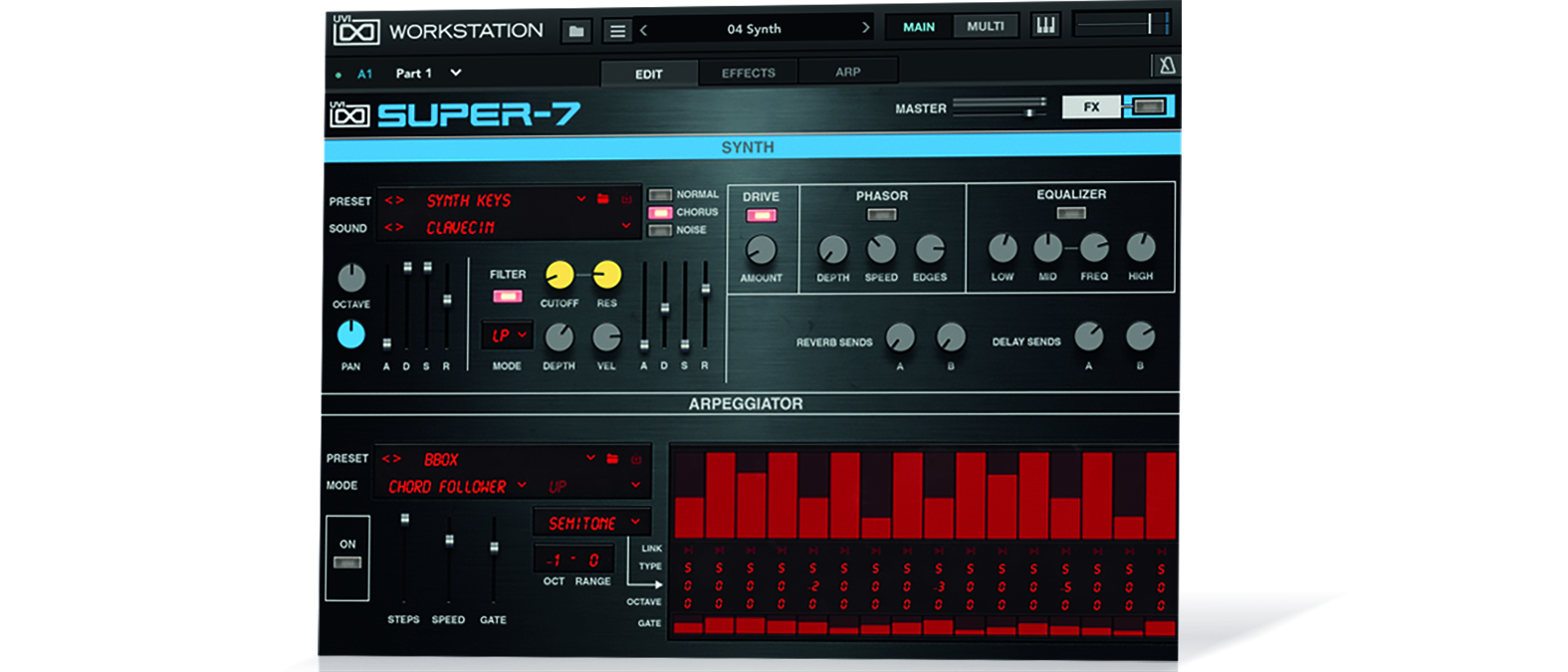MusicRadar Verdict
Re-explores the wealth of sonic weight provided by its Juno and 707 counterpart, with many substantial benefits.
Pros
- +
Charming representation of an unloved classic.
- +
Superb, production-ready sounds.
- +
Laden with Juno-106 content.
- +
The drum section is very comprehensive.
- +
A bargain, given the amount of content.
Cons
- -
No on-board drum sequencing included.
- -
Sample based, not modelled.
MusicRadar's got your back
UVI Super-7: What is it?
Karaoke is something of a national pastime in Japan, and while other parts of the world may not share the fascination for public vocal humiliation to the same degree (although X-Factor comes close) it never prevented Roland from trying to bring a little bit of that magic into a domestic setting.
Enter one such device, which harks back to the mid-80s. The MKS-7, also branded the Super Quartet, was a desktop and rack-mounted band-in-a-box, designed to bring karaoke to a living room near you.
Preset classics
The MKS-7 was a preset device, split into four sections providing bass, chords (synth), melody (lead) and drums. As it was preset, editing was severely limited. This was a colossal shame as the synth engine was borrowed from the Juno 106, while the drum sounds were similarly repurposed from the TR-707. Shortly after release, the MKS-7 completely bombed in price, leaving it to the tech-savvy to infiltrate the MKS-7 with SysEx editors, allowing control of the onboard sound sources.
Thankfully, UVI has an extensive and highly enviable track record in sampling modules of this kind, which it has undertaken with its usual panache and detail. Running within its reliable, and freely available Workstation player (or Falcon 2 synth), the Super-7 is split into four segments, like the original.
UVI Super-7: Performance and verdict
Beginning with the drum section, UVI has included the 707 complement, but also added CR-78, 606, 626, 808 and 909 samples. Also included are elements from its Drum Designer suite. It’s worth celebrating what we have here; the 707 has become a cult classic, with a sampled sound more akin to a Linn Drum, with additional representations from the ever-analogue elements of the 808/909. Moreover, these UVI sounds are production-ready, with solid weight and spirit. Simply fantastic.

• Roland Juno 106
This modelled alternative from Roland is one of the best in its class.
• Softube Model 84
Complete with a semi-battered casing graphic, this is modelled to a very exacting specification.
Somewhat regrettably, there is no drum pattern editor, but you can trigger preset patterns, while also triggering individual sounds from within your DAW. It’s also a simple procedure to export the patterns as MIDI files, for dropping into the DAW and programming potential.
Over in 106-land, preset sounds are split between the Bass, Melody and Synth sections. While there’s a similarity between these areas, the distinction is apparent through the preset content and its access to polyphonic operation.
The bass sounds benefit from that beautifully familiar 106 depth, and while there are a smattering of presets, UVI has sampled a huge number of 106 waveforms, combining Saw, Square, a sum of both and the sub. These are great start points for user patches, alongside the section’s arpeggiator. Meanwhile, the fantastic overdrive and equalisation sections shore up those UVI production-ready principles.
Sampled programmability
While the original Super Quartet was a preset machine, armed with the right SysEx tools and software, you could mangle the internal sounds. This allowed for the presets to be repurposed to suit production, rather than dictating it.
This role reversal is where the Super-7 scores high, though do note the context. UVI instruments are sample-based and not modelled. Consequently, Super-7 shows an extensive set of pros and cons; the sound you hear is the real deal, straight from an original machine, so you cannot argue whether it sounds like an original or not! UVI has extensive skills in this arena, with some of the best sounding softsynth facsimiles around.
However, the company has also taken matters to the next level, with dual envelope control, real-time arpeggiations, effects and more. This means you have a large amount of programmability, albeit complete with a filter that is functional, rather than modelled, but it does do a highly convincing job.
Let’s applaud UVI; the Super Quartet was a mostly-failed box with great charm. UVI has captured this spirit, providing multi-layered-presets for an instant 80s karaoke soundtrack, with a single note trigger. The Super-7 gives all the 106-style samples from the ground up, with an additional multimode filter, which provides a versatile colour as an addition to the sampled content. Add extensive effects, two envelopes and tons of programmable options and this is a nifty way to get a 106 and 707.
MusicRadar verdict: Re-explores the wealth of sonic weight provided by its Juno and 707 counterpart, with many substantial benefits.
UVI Super-7: The web says
"UVI’s new Super-7 intrument is an easy-to-use source of classic 80s sounds that’s an all-in-one solution."
SoundBytes
UVI Super-7: Hands-on demos
UVI
Marula Music
Nu-Trix The Synth Guy
Dash Glitch
UVI Super-7: Specifications
- Runs in UVI Workstation version 3.0.17+, and Falcon version 2.1.4+.
- iLok account (free, dongle not required).
- Mac OS X 10.9 Mavericks to macOS 10.15 Catalina (64-bit)/ Windows 8 to Windows 10 (64-bit).
- 5GB of disk space.
- Hard Drive: 7,200 rpm recommended or Solid State Drive (SSD).
- 4GB RAM (8 GB+ highly recommended for large UVI Soundbanks).
- CONTACT: UVI
Computer Music magazine is the world’s best selling publication dedicated solely to making great music with your Mac or PC computer. Each issue it brings its lucky readers the best in cutting-edge tutorials, need-to-know, expert software reviews and even all the tools you actually need to make great music today, courtesy of our legendary CM Plugin Suite.
“I have an original 909 – every time I try to use it I feel like I’m ruining it”: House hero Riva Starr on his studio essentials and his love of analogue synths
“A synthesizer that is both easy to use and fun to play whilst maintaining a decent degree of programming depth and flexibility”: PWM Mantis review
“I feel like that song had everything we needed to come back with”: Bring Me The Horizon’s Lee Malia on Shadow Moses, its riff and the secrets behind its tone, and why it was the right anthem at the right time











